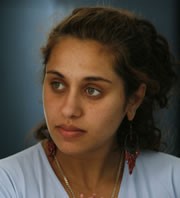Romani, Sinte in Kazakhstan

Photo Source:
Copyrighted © 2026
International Mission Board-SBC All rights reserved. Used with permission |
Send Joshua Project a map of this people group.
|
| People Name: | Romani, Sinte |
| Country: | Kazakhstan |
| 10/40 Window: | Yes |
| Population: | 5,000 |
| World Population: | 222,900 |
| Primary Language: | Romani, Sinte |
| Primary Religion: | Islam |
| Christian Adherents: | 2.00 % |
| Evangelicals: | 0.40 % |
| Scripture: | Complete Bible |
| Ministry Resources: | Yes |
| Jesus Film: | Yes |
| Audio Recordings: | Yes |
| People Cluster: | Romani |
| Affinity Bloc: | Eurasian Peoples |
| Progress Level: |
|
Introduction / History
In their homeland of India, they were originally called Dom, meaning man. Later, Dom developed into Rom. Today, they prefer to be called Romani in Europe; but in the Middle East and North Africa, many still refer to themselves as 'Dom' or 'Domi'. Here, the term 'Dom' will be used for this people group found in the Middle East, and 'Romani' will be used as a general, more recognizable designation for the larger people group. One of the Romani subgroups is the Sinte, who have their own language. Some Sinte Romani live in Kazakhstan. Most of them live in various European countries.
Originally coming from India, the Romani are now scattered throughout the world. Little is known today about the lives of the Dom who live in the Middle East. This is largely due to the closed communities they maintain. Too often, Dom are not counted in the national census, or they hide their identity on purpose.
What Are Their Lives Like?
Sinte Romani lifestyles vary widely in Kazakhstan. There are those who maintain a nomadic lifestyle. They offer their services as entertainers, musicians or metal workers to other nomadic groups. Also included in the nomadic lifestyle are those who are migrant workers. They can be found harvesting crops for a living.
What Are Their Beliefs?
The Romani people tend to adopt the dominant religion of their host country. For Kazakhstan, this is Islam. Some Sinte Romani go on the pilgrimage to Mecca. While there are some devout Muslims among the Sinte Romani, the majority are only nominal Muslims. They consider religion a personal matter, and they are hesitant to talk about it with anyone. Superstition and "the good elements" of many religious systems make up the nature of their beliefs. Spiritism is dominant in their thinking as to why things happen in the world. They strongly fear evil spirits and curses. Dom fortunetellers offer to make clients a potion that will ward off curses.
Though the Sinte Romani are reached in other countries, they remain Muslim in Kazakhstan.
What Are Their Needs?
In almost all the countries they live in, their rudimentary command of the local language and limited use of written documents have contributed to their political powerlessness. Some who have settled are in transition, as they seek to become a part of the social systems around them. To fit in, they may abandon the traditional clothing, tattooing, dancing and fortune telling that are part of the Romani lifestyle. They may even deny their ethnic identity.
Due to their poverty, they are often unable to pay hospital fees when children are born. In this case, no birth certificate is issued, so the possibility of securing citizenship is forfeited. The concept of owning land is not inherent to the nomadic world view, and they find it difficult to adjust to such an outlook. Few families own the plots of land on which they locate their settlements or camps. Therefore, they are often subjected to forced relocation.
Prayer Points
Pray for the Sinte Romani people in Kazakhstan to have the spiritual hunger it takes to seek and find the only savior.
Pray for Christ followers to have the boldness to stand for Jesus no matter what the cost.
Pray for devoted workers.
Pray for Sinte Romani disciples who will make more disciples.